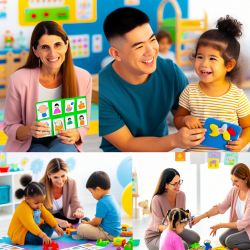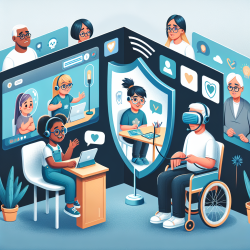As a Special Education Director deeply invested in the continuous improvement of intervention strategies for our students, I have come across a pivotal piece of research that sheds light on the effectiveness of language intervention with language delayed kindergarten children. This study, conducted by David Illerbrun, Ph.D., Leonard Haines, Ph.D., and Pauline Greenough, M.Ed., provides invaluable insights for practitioners aiming to enhance their intervention techniques or seeking to delve deeper into research for the betterment of our educational approaches.
The study meticulously examined the impact of a specific language intervention program on kindergarten children identified with language delays. The children were systematically divided into control and experimental groups to assess the intervention's effectiveness over a period, focusing on both expressive and receptive language skills. What sets this research apart is its methodological rigor, aiming to answer two fundamental questions: "Was the intervention effective?" and "Why was it effective?"
Key Findings:
- The experimental group showed significant gains in all areas of expressive language, as predicted from the intervention model and techniques used.
- Significant gains were also observed in one area of receptive language for the experimental group, showcasing the broader impact of targeted expressive language intervention.
- The control group, with no specific language intervention, also made gains in receptive language, highlighting the natural development over time but at a slower pace compared to the experimental group.
This research emphasizes the importance of a structured, well-thought-out intervention program that targets specific language development areas. It also underscores the necessity of selecting appropriate pre-and post-test measures that align with the intervention's goals, ensuring that the progress can be accurately assessed.
Implications for Practitioners:
- Intervention Model Selection: The success of language intervention significantly depends on the chosen model. It's crucial to select a model that focuses on the child's specific needs, particularly emphasizing expressive grammar development if that's the identified area of delay.
- Goal-Oriented Assessment: Pre-and post-intervention assessments should closely match the intervention's objectives, enabling practitioners to measure what has been taught effectively and adjust strategies as needed.
- Understanding the 'Why': Beyond determining the effectiveness of an intervention, understanding why an intervention succeeds is critical for refining and improving future strategies. This involves analyzing the components of the intervention, such as the teaching methods, involvement of personnel, and the nature of activities.
The study's findings advocate for a holistic approach to language intervention, one that is meticulously planned and executed with a clear focus on the child's individual needs. It calls for speech-language pathologists and special education practitioners to critically evaluate the effects of their interventions, continuously seeking answers to both the effectiveness and the mechanisms behind successful outcomes.
For educators and therapists, this research offers a compelling blueprint for structuring more effective language intervention programs. By incorporating the lessons learned from this study, practitioners can significantly enhance the quality of support provided to language delayed children, ultimately fostering better communication skills and a stronger foundation for future learning.
In conclusion, the study by Illerbrun, Haines, and Greenough serves as a critical resource for anyone involved in the education and support of language delayed children. It not only demonstrates the potential for significant improvement through targeted intervention but also provides a framework for understanding the complexities behind successful language development strategies. As we strive to support every child's unique learning journey, integrating these research-backed insights into our practices can lead to more impactful outcomes and a deeper understanding of language acquisition challenges.
For those interested in exploring this research further and integrating its findings into their practice, I highly encourage a thorough review of the original study. Intervention Effectiveness with Language Delayed Kindergarten Children provides a comprehensive overview of the methodology, results, and implications, serving as a valuable tool for enhancing our approaches to language intervention.










